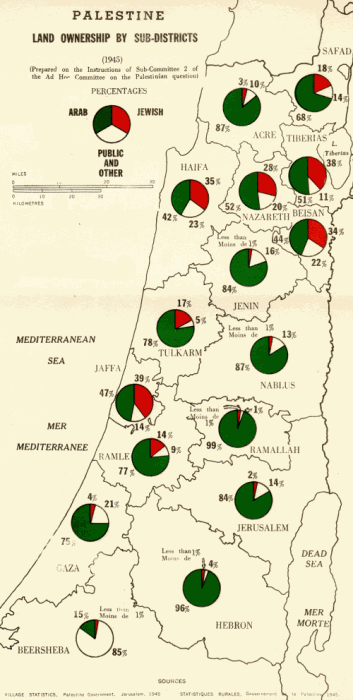Pages in Section 12

Police Reaction to UN Partition Plan
ii.British Alienate UNSCOP
iii. The Two Sergeants
iv. End of the PMF
v. Life at Bassa Tegart 1947
vi. UNSCOP's Partition Plan and UN vote.
vii. Police Reactions to UN Vote
 The senior officials administrating civil departments of Palestine, must have despaired after comparing the UN partition plan with their latest district and population maps.
The senior officials administrating civil departments of Palestine, must have despaired after comparing the UN partition plan with their latest district and population maps.
All carefully constructed preparations for an orderly handover of police, post & telegraphs, railways and roads to an independent Palestine were now useless and, given the British government's announcement of an early withdrawal from Palestine. There was no time to start over.
They must have congratulated themselves , however, in training an independent Tel Aviv Force. That, at least, would slot neatly into the new partition plan and so, in theory, would the newly trained Arab police, except the Arabs had no official body equivalent to the Jewish Agency to take control of a police force and three quarters of the Arab population lived in the section allocated to the Jews.
The policen higher echelons saw at once that the the mixed cities, Haifa, Jerusalem, Jaffa, Tiberias and Safad would cause a huge problem. The British administration's initial response to that was to separate, where possible, the Arab population from the Jewish. A system of zones, passes and checkpoints was set up. In addition the army was asked to organise evacuations of population, if that was ever considered necessary.
To individal members of the Palestine Police the result of the UN vote came as a great shock. All members of the British Section worried about future employment and their pension schemes. Several wanted to stay in Palestine and transfer to the UN police force in the Jerusalem International Area but it was unclear as to whether they would have the opportunity to do so.
In parliament the following question was put to Mr. Creech Jones.
"Under what conditions are the British policemen at present serving in Palestine to be taken into the International Force which will look after Jerusalem? That is a question which many are asking. They do not know on what terms, or, indeed, whether they are to be eligible for service in that force. We owe it to them that they should know, at as early a date as possible, on what conditions they will be allowed to serve, and what is to be the law operating in that area.In our efforts to fulfil our duty we have been unsparing, and many British men have devoted their best years to this work. I wonder what the future will be for those British civil servants and British police still in Palestine? My right hon. Friend said he hoped they would be dealt with generously. The Secretary of State for the Colonies really said nothing specific about their treatment and I would ask that when proposals are formulated to deal with them,they should be included in a White Paper which we could discuss and not merely contained in a regulation which we either have to throw out or accept without any power of amendment"
Mr. Creech Jones replied:
"Reference has just been made by the hon. and learned Member to the position of the Civil Service and the police in Palestine. I thought it was within the knowledge of the House that an announcement had appeared both in this country and in Palestine some time towards the end of September, when definite promises were made to the staffs concerned in regard to the future, and I tried to give some indication that as soon as we had concluded certain immediate negotiations a final statement would be made as to their position.(Please does anyone know where I can find the 1947 September announcement?- Ed.)We have studied the situation of the Palestine Police Force, and I hope that before long I shall be able to inform the House of the decisions reached on this and other important Colonial Service questions. Some of these matters must be explored with the United Nations Commission at an early date."
(Please does anyone know where I can find the 1947 September announcement?- Ed.)
For all ranks of police the next few months were a period of personal uncertainty where writing applications for new jobs, and taking time out for interviews seemed more important than the job in hand.
Pat Byrne, afrom the traffic police section writes,
"There were interviews by various police forces hoping to get already trained policemen. I was offered a sergeant's position with a promise of rapid promotion by the Malaysia police force, and a traffic officer's position with the Hong Kong and British police"
The Jewish police were more sanguine. The vast majority of them worked and lived in the section allocated to the Jewish State and were confident that their political leaders would manage their Police Force
For the Arab police there was no such certainty. The majority of them worked and lived outside the Arab section.They had no assurance that even if they remained in the new State of Israel their jobs would be secure and for the most part their loyalties lay with those Arabs intent sizing back from the Jews the land that had been taken from them. Many deserted to join the Arab Liberation armies. Those that remained hoped the British would continue to look after them.
Between the time of the UN vote and the British leaving Palestine, chaos reigned